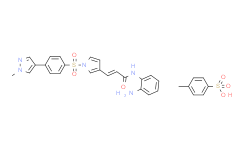Domatinostat tosylate significantly reduces proliferation of all epithelial and mesenchymal UC cell lines (IC50 0.15-0.51 μM), inhibits clonogenic growth and induces caspase activity. Domatinostat tosylate provokes apoptosis activation in CRC cells, while caspase inhibitors (z-VAD-CHO and z-DVED-CHO) significantly alleviate Domatinostat tosylate-exerted cytotoxicity in CRC cells. Meanwhile, Domatinostat tosylate induces dramatic G2-M arrest in CRC cells. Further studies show that AKT activation might be an important resistance factor of Domatinostat tosylate. Domatinostat tosylate-induced cytotoxicity is dramatically potentiated with serum starvation, AKT inhibition (by perifosine or MK-2206), or AKT1-shRNA knockdown in CRC cells. On the other hand, exogenous expression of constitutively active AKT1 (CA-AKT1) decreases the sensitivity by Domatinostat tosylate in HT-29 cells. Notably, Domatinostat tosylate, at a low concentration, enhances oxaliplatin-induced 体外研究 anti-CRC activity. Domatinostat tosylate treatment induces potent cytotoxic and proliferation-inhibitory activities against established HCC cell lines (HepG2, HepB3, SMMC-7721) and patient-derived primary HCC cells. Domatinostat tosylate induces apoptosis signal-regulating kinase 1 (ASK1) activation, causing it translocation to mitochondria and physical association with Cyp-D.
Medlife has not independently confirmed the accuracy of these methods. They are for reference only.



 扫码关注公众号
扫码关注公众号